- Home
- Jessica Day George
Princess of the Silver Woods (Twelve Dancing Princesses) Page 6
Princess of the Silver Woods (Twelve Dancing Princesses) Read online
Page 6
When Oliver arrived home the next morning, Lady Emily was standing in the doorway of the old hall, looking pale and drawn. Her eyes searched her son for any sign of injury.
“I’m fine, but I wanted to make certain that Petunia was all right,” he said in a low voice.
His mother saw several people sidling closer with curious faces, so she smiled and threw up her hands theatrically. “Never worry me like that again,” she scolded. She took Oliver’s arm. “Come have something to eat; you must be famished.”
Oliver let his mother lead him into the room on the upper gallery of the old hall, where they dined. He slumped in one of the chairs while she sent for food and waited until someone had brought him roasted chicken and potatoes. When they were alone once more, and after Oliver had bitten into the largest potato and burnt his tongue in the process, he began to speak. He told his mother everything that had happened from Petunia’s nearly being run down by Prince Grigori’s horse to the realization that it was the grand duchess’s grandson who was tracking him and his men to hiding in the old hothouse.
As he related each part of the story, his mother’s face grew whiter and whiter until he feared she might faint. He reached out a hand to her.
“It’s all right, Mother. But … what does this all mean?”
“I don’t know,” Lady Emily admitted. “But I’ve told you how those poor girls were accused of witchcraft. Their governess was nearly put to death for teaching it to them.”
“Do you think they were guilty?”
“I knew Anne,” his mother said, shaking her head. “She is no more a witch than I am. But something was causing all that horror at the palace: the worn-out dancing slippers and the dead princes, you’ve heard about that as well.”
“Of course.” Oliver drummed on the table and stopped himself with an effort, forcing down a bite of the cooled potatoes.
Of course. The situation with the worn-out dancing slippers was what had prevented his mother from getting him his rights as an earl after the death of his father in the war. Not that he blamed her. He blamed King Gregor. He supposed he could blame Petunia, too, but she would only have been five or six years old, so the very idea was ludicrous. And it was very hard to blame Petunia for anything after hearing her crying out in the night and seeing her menaced by creatures made of shadow.
“There’s something to all this,” his mother went on. “There’s some connection between the grand duchess and the earlier tragedies. I would stake my life on it.”
“But what?” Oliver shook his head, tearing off a hunk of bread to sop up the gravy. “Because the grand duchess is one of the Nine Daughters of Russaka? What would that have to do with worn-out dancing slippers?” He tried not to sound derisive. He really did want his mother’s opinions on the matter, but if she started talking about fairy stories again …
“The Nine Daughters of Russaka bore the sons of the King Under Stone,” his mother said primly. “But no one has ever said whether the Nine Daughters had any further contact with the King Under Stone, or the babies. Did they ever see their sons again?” His mother looked at him archly.
Oliver began to think. His mother believed that this had really happened. And heaven knew that he had seen some strange sights, even before last night. The forest was full of odd creatures, mysterious lights—and Karl’s wife claimed to have found a dragon’s lair while gathering mushrooms one day. What if the King Under Stone was real? What if he had fathered nine sons with the Russakan princesses, and one of those princesses was now the Grand Duchess Volenskaya? Was she allowed to visit her son? Did the King Under Stone have a hold over her?
“Let’s say that the grand duchess did have a child of the King Under Stone’s,” Oliver said. “Where is the child now? Is it human?”
“Exactly,” his mother said, looking uneasy. “No one knows. And what all this has to do with Petunia and her sisters, I don’t know, either. But I do know that something strange is happening around those girls again.”
“He fathered nine sons with nine sisters in Russaka,” Oliver said, convulsively swallowing the last bite of chicken with a dry throat. “But who’s to say he doesn’t have more? And if the king of Westfalin has twelve daughters … whose suitors kept being killed …” He shook his head, dismissing the idea. “It’s all too strange, and we just don’t know enough,” he said.
His mother put both hands to her mouth, face chalky white. “I just hope the King Under Stone doesn’t see you as a potential suitor,” she said in a strangled voice.
Oliver laughed bitterly. “Please, Mother, I’m not even a real earl.”
Chilled
Must this window be open? It’s freezing!”
Petunia slammed her window shut yet again, wincing at the chill wind that bit into her borrowed nightgown. It seemed that the Princess Nastasya cared more about the draping of fine muslin and cobweb lace than catching her death of cold—and the matching dressing gown was hardly any warmer. It also appeared that Olga was attempting to kill Petunia by keeping her window open all night.
When Petunia had awakened from her nightmare, there had been cold air and mist pouring into the room through the open window. But no sooner had she shut it than Olga had peeped into the room to see if she was all right, and immediately bustled over to open the window again, saying that the “brisk” air was good for the complexion. Petunia’s demands that the maid leave the window shut fell on deaf ears, so between skirmishes in the window war she had snatched little sleep.
And now she wanted very much to write to Rose and Galen about her latest nightmares, but Olga insisted on dressing her for breakfast at once. Petunia was still not certain that she was only dreaming the shadowy figures in the garden and needed to tell her sisters. The shadowy figures looked different, older, and those princes who had died when she and her sisters had escaped the Kingdom Under Stone did not appear, which made all too convincing an argument that what she was seeing, both in the gardens and in her dreams, was real.
But she couldn’t write the letter with Olga fussing over her, pulling up Petunia’s stockings, chivvying her into a freshly altered gown. Though Petunia had to admit that Olga had done a wonderful job—the gown fit as though it had been made for Petunia, and she determined at once to keep it. Then there was her hair to be done up and her face to be powdered and rouged, even though King Gregor did not approve of such things. But her father was not here, Petunia reasoned, studying the effect in the mirror.
“Very nice,” she complimented Olga, who glowed at the praise. “Now if you’ll excuse me, I really must write a letter to my sister.”
“Oh, no, Your Highness!” Olga hustled her off the dressingtable stool and toward the door. “You must go downstairs at once! They’ll be waiting for you in the breakfast room! I’ll show you myself.”
“No, really I’m sure that I can find it in just a moment,” said Petunia helplessly.
She was already out the door of her bedchamber and going down the corridor now, with Olga pushing gently on the small of her back. Really, Petunia was starting to think that the maid didn’t want her to write a letter at all, and why would Olga care about such a thing? Perhaps Olga was worried that she would be blamed if Petunia was late for breakfast, so Petunia let herself be pushed down the stairs and into the breakfast room.
The breakfast room was empty save for a footman laying out silverware. He bowed to Petunia and hastily set down the rest of the forks before bowing his way out. Petunia raised her eyebrows at Olga.
“Oh, good, you are early,” Olga said. “I am sure that Her Grace and His Highness will join you shortly.” Then she curtsied and left, leaving Petunia gaping at her.
“She’s completely mad,” Petunia grumbled to herself. “But very good with a needle.”
With nothing better to do, Petunia took a plate and helped herself to rolls and soft cheese, preserves, and toast. The grand duchess did not care for coffee but preferred the strong, dark Russakan tea, which Petunia also loved, so she pour
ed herself a cup.
She had had a roll and was spreading marmalade on toast when Prince Grigori and his grandmother entered the room. Petunia dropped her toast and leaped to her feet to curtsy to the old lady, who looked her over with an approving eye.
“That gown suits you. You should keep it.” The grand duchess sank down into the chair that Prince Grigori held for her.
“Thank you, ma’am, I would love to,” Petunia said with gratitude. She sat at her own place, self-conscious about the crumbs on the white tablecloth that made it look as though she had eaten at least a half-dozen rolls instead of just one. “If Princess Nastasya doesn’t mind, that is.”
“She will never notice.” Prince Grigori laughed. “My cousin has more clothes than any three young ladies put together!”
He filled a plate for his grandmother and himself and sat down opposite Petunia. He smiled at her and gave a subtle wink. To her embarrassment, Petunia felt the color rising in her cheeks. She took a sip of tea, which was too hot and nearly choked her, and managed to recover without gasping or spitting the dark liquid onto the table.
“We cannot have you languishing here in that beautiful gown,” the grand duchess declared, fortunately not noticing Petunia’s moment of distress. She gave Prince Grigori a meaningful look, and Petunia thought he dipped his chin in a subtle nod. “After breakfast, Grigori must take you around the gardens. It is winter, but your work in your father’s gardens is well known, and I’m sure mine will hold some small interest for you.”
Did everyone here want her to catch her death of cold? Petunia wondered.
“That sounds lovely,” she said.
“My Grigori, I know you feel you must go about your duties, but please be a gallant and keep dear Petunia entertained during her visit.” The grand duchess’s voice sounded very studied, as though she were trying to sound spontaneous but had rehearsed her words in advance. “I charge you with keeping her from boredom, Grigori. It is your new calling in life.”
“It would be my pleasure,” Prince Grigori said. He didn’t sound quite as rehearsed, but he was obviously not at all surprised by the request. “However, the small matter of my duty to the king will still remain,” he added, making a face.
Petunia tried her best not to feel snubbed or to read too much into the strange playacting of both grandmother and grandson. She picked up her toast and continued to spread marmalade on it as calmly as she could.
“What duty to the king?”
“I have promised your royal father that I would hunt down these two-legged wolves,” Prince Grigori said. “And as yet I have had no luck.” He shook his head in self-deprecation.
Petunia felt a little sick. Had her father really ordered Grigori to hunt Oliver and his people, as though they were deer or foxes or … actual wolves? And if Grigori caught them, what then? Was he supposed to bring them to Bruch, or had her father given Grigori the authority to mete out punishment on the spot?
“How long have you been hunting them?” she finally asked.
“Since King Philippe of Analousia’s brother was accosted in the autumn,” Prince Grigori replied. “They took everything: gold, jewels, even his wife’s fur cloak. The only things of value they left the poor lady were her wedding ring and a mourning brooch containing a lock of hair. Things of sentimental value, of no worth to the bandits.”
“How kind,” Petunia murmured.
Prince Grigori snorted his agreement, thinking that she was being facetious.
“Your men may continue the hunt,” the grand duchess said. “But I would like Petunia to not sit here all day, bored as a brick, dancing attendance on an old lady like me.”
“I don’t mind,” Petunia protested.
“Don’t be silly,” the grand duchess said, not taking her gaze from her grandson. Her face was hard. “Grigori can spare some time for you.”
Petunia busied herself with her breakfast, and so did the prince. Petunia didn’t know what to say. Prince Grigori clearly did not want to argue with his grandmother, and Petunia could hardly blame him. The grand duchess was so very sharp, both in wits and speech, and there was an air about her as if she could not tolerate the weakness of those around her.
If there was any truth to the legend of the Nine Daughters of Russaka, Petunia thought suddenly, this is precisely what one of them would look like now. Beautiful and hard and full of secrets.
Once breakfast was finished, Petunia walked to the entrance hall with Prince Grigori, where they found Olga waiting with Petunia’s cloak and some white mittens. Petunia wondered if her maid had been eavesdropping on the breakfast room conversation, or if she was such a good lady’s maid that she simply knew these things through some sixth sense. Grigori’s valet appeared mere seconds later with his overcoat, hat, and gloves.
As Petunia put on the mittens, she thought with a pang of the fingerless gloves she hadn’t finished knitting. They would not be as warm, but they would look less childish. And she was accustomed to wearing knitwear with considerably more embellishment than this.
“Are you ready?” Grigori sounded impatient, but like he was trying to hold it in check.
“Of course,” Petunia said, pulling away from Olga, who was attempting to retie her cloak with a more flattering bow.
Petunia gave the bow a tweak of her own, no doubt only making it crooked, but not really caring. The cloak was so glorious that it could hardly be marred by having a crooked bow. Even Grigori’s hard eyes softened as he got a good look at Petunia with her black hair framed by the scarlet hood with its scrolls of silver embroidery. He held out his arm to her, and she took it, wishing that there were not quite such a discrepancy in their heights. He had to hold his arm down low and she had to reach up a bit more than was comfortable. Still, by the time they had gone out to the path to the gardens, they had fallen into a kind of rhythm with their steps that felt quite natural.
But it soon became apparent that Prince Grigori knew next to nothing about gardens. Petunia had to stifle her giggles as he waved his free arm vaguely at “Some sort of trees. The hedges. A statue.”
Petunia finally couldn’t conceal her laughter. “That was a rosebush,” she said when he looked at her questioningly.
“I beg your pardon?” He stopped and looked back at the rose, which had been trimmed into a small ornamental tree. “It is a very stunted tree, I believe.”
“Forgive me, Your Highness, but I can assure you that it is a rosebush. It has been pruned into that shape.”
She gently touched the bare branches with her mitten, wondering what color the rose was. If it was yellow, she might take a slip home, but she guessed that most of the roses in this garden would be white, pink, or red. They always were, in gardens where nobody truly cared about such matters. This garden was very clean: everything neatly pruned or wrapped for the winter, the grass short, the paths swept, but it was … well, boring. She could almost predict the hedge maze that was sure to appear on their left, just past the large fountain shaped like a nymph pouring water.
“It’s true,” Prince Grigori admitted with a laugh. “I don’t know much about these gardens. Well, can you forgive me? They are all your Westfalian trees and flowers!”
Petunia had to laugh too. But when she looked around to point out some of the better features of the common Westfalian garden in winter—such as they were—she realized that he was wrong. These weren’t Westfalian trees and flowers; they were Bretoner.
Her laugh died on her lips as she realized that this was Lady Emily’s garden. Oliver’s father must have planted it for his new Bretoner bride just the way her father had planted the garden for Maude in Bruch. It was on a less grand scale, true, but all the signs were there that someone, here in the middle of the Westfalian Woods, had tried to make a small corner of Breton.
“What’s the matter, princess?” Prince Grigori stopped, looking at her with concern. “Are you homesick already? Or tired from walking? Let me take you back to the house to rest.”
“Oh, no,
it’s …” She realized that she could hardly tell him what was the matter. She hesitated. “Well, perhaps I am still a little rattled by the accident with the coach.”
She looked down at the ground so that he couldn’t detect the lie in her eyes. No one but her sisters could ever understand that the possibility of Rionin and his brothers crawling into her bedroom was far more terrifying than being in a runaway carriage.
As she stared at the lawn around them, however, avoiding the prince’s piercing eyes, she got another shock. This one nearly made her reel, and as she swayed just a little, Prince Grigori held her even closer.
“Are you faint? Are you ill?”
“No. Yes. Please take me inside,” Petunia said, her voice shaking.
His black brows drawn together in concern, Prince Grigori put one arm around her waist and guided her swiftly back to the manor. He must have thought Petunia was nearly swooning because she could not seem to raise her head, she was so busy staring at the lawn.
The winter-dead grass, still lightly dusted with frost despite the weak sunlight, bore the tracks of a half-dozen men. The trail of footprints led directly from the far end of the gardens to the flowerbed beneath her bedroom window. Any doubt in her mind fled, and she knew that Kestilan and his brothers had slipped out of the Kingdom Under Stone and come after her.
Supplicant
You’re going to be executed; you know that, don’t you?” Having said this, Simon lay back on Oliver’s bed and watched him pack, not appearing all that concerned.
“Well, I have robbed a great many coaches,” Oliver said philosophically. “I suppose that it’s only fair that I pay the price for that. Since I cannot give back the money now.”
“And Mother approves of this scheme?”
“I am the earl, and the head of this household,” Oliver said, all attempt at humor gone.
Oliver was the earl. It was time that he started acting like one.
He finished packing. He didn’t own that much: a few changes of clothing, including a suit that had been his father’s and that his mother had tailored to fit him. He would save that for his audience with the king, of course. He had some books and a few other effects, but there was no sense in taking them. Simon could have them if Oliver didn’t return.

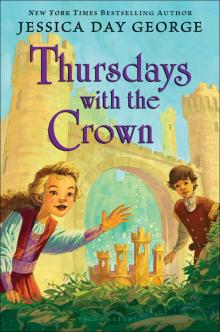 Thursdays With the Crown
Thursdays With the Crown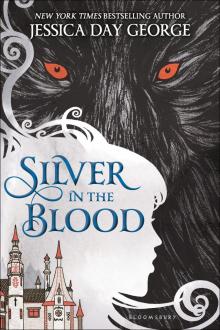 Silver in the Blood
Silver in the Blood Saturdays at Sea
Saturdays at Sea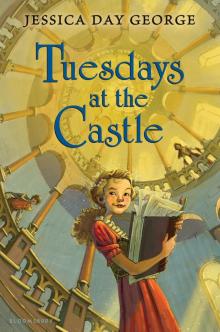 Tuesdays at the Castle
Tuesdays at the Castle Dragon Flight
Dragon Flight Dragon Spear
Dragon Spear Dragon Slippers
Dragon Slippers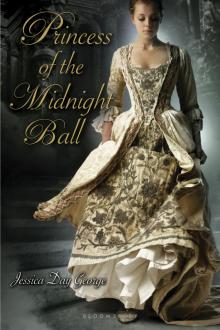 Princess of the Midnight Ball
Princess of the Midnight Ball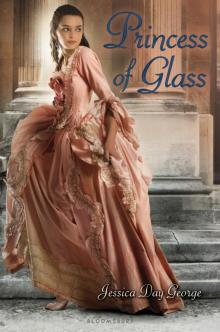 Princess of Glass
Princess of Glass Sun and Moon, Ice and Snow
Sun and Moon, Ice and Snow The Rose Legacy
The Rose Legacy Princess of the Silver Woods
Princess of the Silver Woods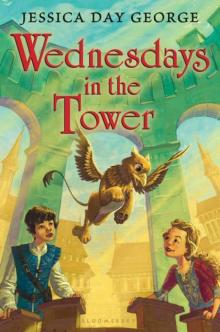 Wednesdays in the Tower
Wednesdays in the Tower The Queen's Secret
The Queen's Secret Princess of the Silver Woods (Twelve Dancing Princesses)
Princess of the Silver Woods (Twelve Dancing Princesses) Dragonskin Slippers
Dragonskin Slippers